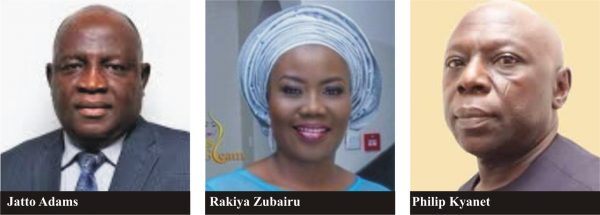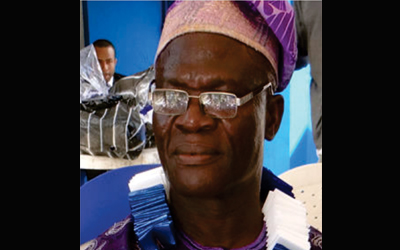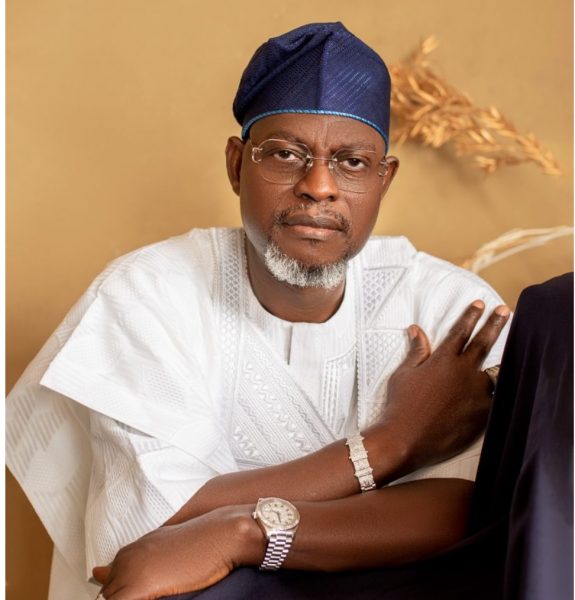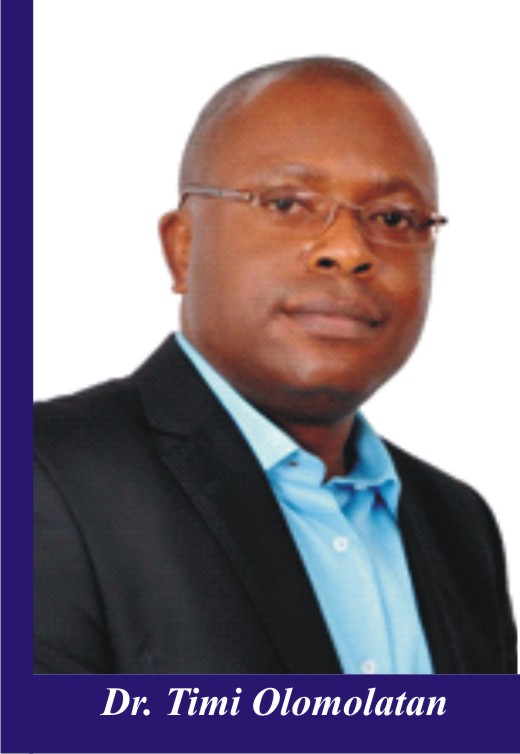NPA: Promoting Healthy Competition Among Maritime Stakeholders
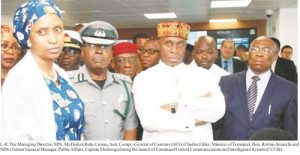 It is not entirely out of place to expect the emergence of a female leadership at the Nigerian Ports Authority (NPA) to bring about ‘change’ in the core values of the Authority and herald a campaign for healthy competition among other stakeholders in the maritime sector.
It is not entirely out of place to expect the emergence of a female leadership at the Nigerian Ports Authority (NPA) to bring about ‘change’ in the core values of the Authority and herald a campaign for healthy competition among other stakeholders in the maritime sector.
However, the manner in which the current Managing Director of NPA, Ms Hadiza Bala-Usman has been campaigning for an efficient port environment where stakeholders at various levels are pitched in a healthy competition that would see the nation’s port system become more efficient and productive, is commendable.
The maritime sector encompasses very diverse range of activities that include shipping, ports, shipyards, ship repairs, dredging, freight forwarding, inland and coastal water regulation etc. therefore, the stakeholders in the sector are numerous, but they can be grouped into two parts;
The management stakeholders or regulators which comprises government agencies such as the Nigerian Ports Authority (NPA), Nigerian Shippers Council (NSC), Nigerian Maritime Administration and Safety Agency (NIMASA), National Inland Waterways Authority (NIWA), Nigerian Railway Corporation (NRC), National Agency for Food, Drug Administration and Control (NAFDAC), Council for the Regulation of Freight Forwarding in Nigeria (CRFFN), Nigerian Customs Service (NCS), amongst others.
The other stakeholders who are also service providers and consumers at the ports include; Shippers associations, Inland Container Depot (ICD) operators, Bonded terminal operators, Chandlers, Freight forwarders, Stevedores, Maritime Workers Union of Nigeria (MWUN), Maritime journalists, Merchant Navy, etc.
There is no doubt that stakeholders are critical components of the port industry, so there is a need to carry everyone along. Usman has vowed to ensure that no organization operating in the maritime sector enjoys monopoly and she has made modest efforts to walk the talk by consulting and meeting stakeholders in their groups to help her better communicate NPA policy thrust.
Recently, she made history as the first Managing Director of NPA to pay working visits to freight forwarding groups another strategic effort towards ensuring a stable and efficient port system where every group knows its onus and goes about it dutifully.
However, this didn’t start now as she has always promised to bring all operators to the table to fashion out ways to improve the sector and make sure Nigeria gets the maximum benefit from it.
“We believe in stakeholders consultation, we are going to bring everyone to the table for us to seat down and ensure that there is need for us to work together. As an authority, we are going to lead and ensure that local content is provided. We will step beyond the things that we historically used to do so that whatever is required for the operators to work together for Nigeria to have the maximum benefit that it can attract for itself within this environment. We will reach out to the respective ministries and work together in ensuring that this is achieved” she said during her first three months in office.
This is in sync with some of the solutions suggested by the Chairman, Ports Consultative Council (PCC) Otunba Kunle Folarin when he spoke to MMS Plus recently on how unhealthy rivalry among agencies in the maritime sector especially as a result of the similarities in the functions contained in their establishing acts could be addressed.
Recognizing the fact that the issues which bring about conflict most times among maritime agencies are in their various enabling acts and each party would claim, rightfully that such function is in their laws, Otunba Folarin proffered these solutions:
The first one is to go to the National Assembly to say we want to domicile this function in Agency ‘A’ and remove it from establishing Acts of Agencies ‘B’ and ‘C’ but this requires the National Assembly to amend the various acts where the conflicts are and it could take years to achieve this.
The second option is inter-ministerial solution because the National Assembly procedures take a long time and it would also have to queue behind the many bills pending. Inter-ministerial solution would be ideal if it cuts across two or more ministries like it does in certain instances. However, most of the issues are between agencies under the Ministry of Transport so it wouldn’t be difficult to reach an agreement to say Agency ‘A’ should continue a particular function to an extent while Agency ‘B’ continues from the point where Agency ‘A’ stopped.
For instance, on issues like wreck removals, we can say Agency ‘A’ should continue to remove the wrecks but Agency ‘B’ should be the custodians of those wrecks so the two parties are doing something. If the issue borders on pollution, you can say when the pollution is within the estuary of the port environment, let it be the responsibility of the NPA; when it happens in the inland waterways, NIWA could handle it while NIMASA should be responsible when it happens outside the ports but within Nigerian territorial waters. All parties should be happy to be involved but the long term solution would be to have a study of the issue and relate it to the international convention and also consider which agency is best equipped for the job.
Usman, during recent familiarization visits to the Lagos Deep Offshore Logistics Base (LADOL) and Nigerdock Snake Island Free Zone both in Lagos maintained that no organization operating in the maritime sector would enjoy monopoly in the provision of oil and gas logistics.
This was her reaction to the Chairman of Nigerdock, Anwar Jarmakani, who complained earlier to the NPA boss that monopoly was a threat to the provision of oil and gas logistics in the country. He alleged that some companies were promoting monopoly and also sabotaging his company in the logistics business.
“We will look to determine the area we will provide support for all. Within the next few months, we will look at all the enabling legislation to determine whether any monopoly exists or not. We will ensure that there is effective regulation that is transparent, that we all can understand. We will ensure that no organization entrenches monopoly that can affect the development of Nigeria as a whole.
“Our plan is to ensure a regulatory environment that promotes the industry. We are looking at ensuring that there is competition; we have visited most of the terminals at the various ports we feel the need for the government to ensure that local content for example is adhered to” she stated.
Usman stressed that she would ensure a level playing field for all operators and promote healthy competition and the Former President of the National Association of Government Approved Freight Fowarders (NAGAFF) Dr. Eugene Nweke pointed out Hadiza’s act of visiting stakeholders as a good omen that shows she understands the need for collaboration because nobody has the monopoly of knowledge required to transform the industry.
According to Dr. Eugene such collaborations would lead to a port system where there would be harmony and guarantee a healthy and competitive environment for the industry to grow.
“This new style of leadership creates a healthy, competitive and viable port environment. I commend her vision, doggedness, understanding of the port because the port deals with people who are the operators and stakeholders. She is carrying everyone along and ensuring nobody is left to feel unimportant. The dockworkers, freight forwarders stevedores, etc. play roles in ensuring the cargo gets to the final destination.
“She has said that NPA intends to create a cargo village where freight forwarders can stay to do their jobs. There is need for automation of all ports processes so that we can come up with a national single widow. We must stop or reduce to the minimum, the contact with cargo. The moment we achieve this, only people who have business in the port will go there.
Hadiza’s visit to the Association of Nigeria Licensed Customs Agents (ANLCA) and the National Association of Government Approved Freight Forwarders (NAGAFF) enabled her discuss salient issues concerning NPA with the stakeholders and it takes her closer as she thrives to attain a healthy, competitive, viable and efficient port environment which can’t be achieved without input from the stakeholders.
Apart from being as administrator, she is also showing the characteristics of a mother as she sees other stakeholders as her kids from a leadership position.
Hadiza once asked one of her executives at NPA to provide her with the tariffs of ports in Western and Central Africa only to be told that NPA did not have all of the information because the ports authorities were not keen to share the tariffs as a result of the competition across the West and Central Africa coast.
“I found that bizarre because what we need to work with across the boards in all ports is to share data and information. As a result, we’ve put our tariffs on our website and the pages of newspapers so that the world can see what we are charging. I have seen some other African countries such as Ghana do the same. Some of these things are part of the lack of transparency that we’ve seen in the past. There is also the absence of accountability whereby we have contractor obligations that are not met. I am holding talks with our procurement department to create a blacklisting of contractors that do not deliver on their obligations to the authority” Hadiza said in a recent interview with a national daily.
Hadiza also acknowledges that some of the challenges NPA faces have to do with the compliance of terminal operators and indeed the authority itself, especially where NPA failed to effectively handle some of its obligations as an authority.
“While we looked at terminal operators and all other entities operating in the maritime industry and expect them to comply with these obligations, we also as an authority need to comply with our obligations. It is a challenge and the authority is poised to ensure that we meet our own obligations as we call on the other stakeholders to meet theirs” Hadiza says.
The present leadership of NPA under the guidance of Hadiza seems to have understood the level of professionalism, collaboration and efficiency of port services required to make Nigeria attain the status of a maritime hub. The move to make Nigerian ports more competitive has only begun and investors would clearly see the attractiveness and benefits of bringing their businesses to Nigeria.
This commendable development doesn’t only rest with Hadiza Bala-Usman but it should also be extended to the managerial team at the authority as well as the rank and file, because each person plays a role in ensuring success is achieved at the authority and sanity in the Nigerian port system.
By Kenneth Jukpor



